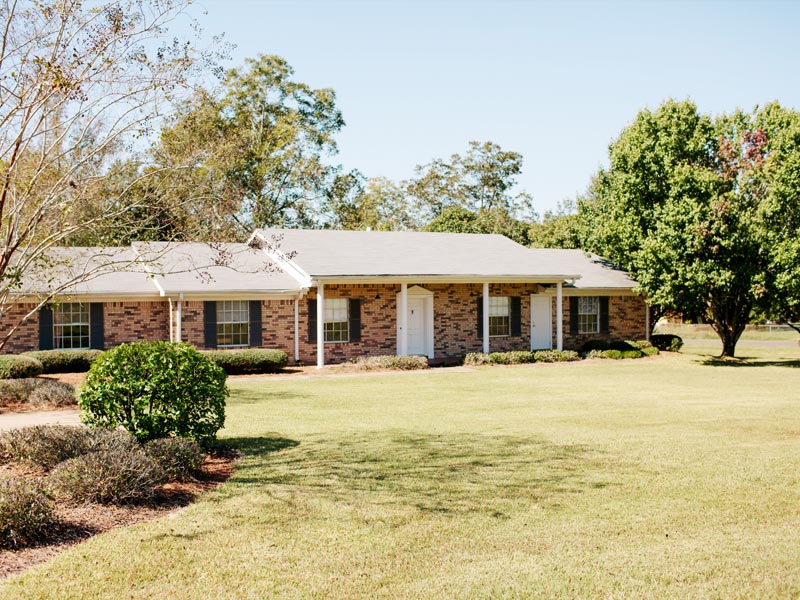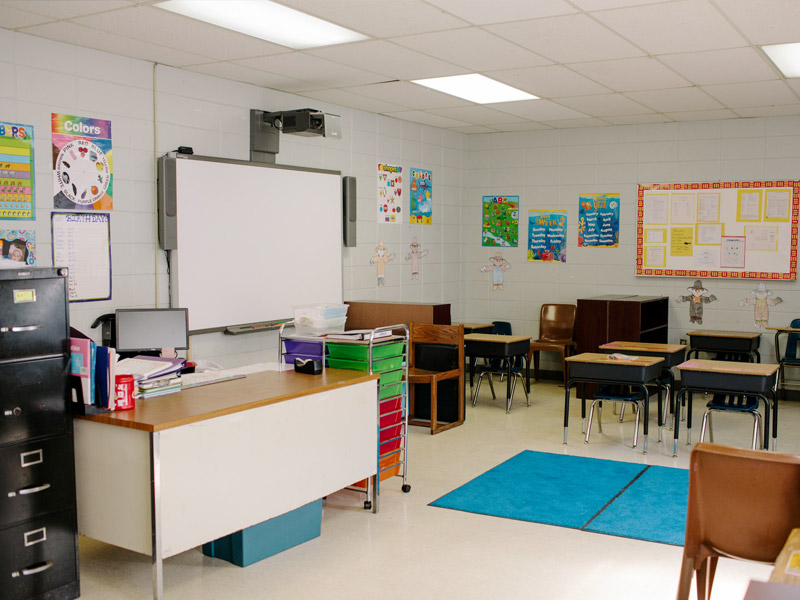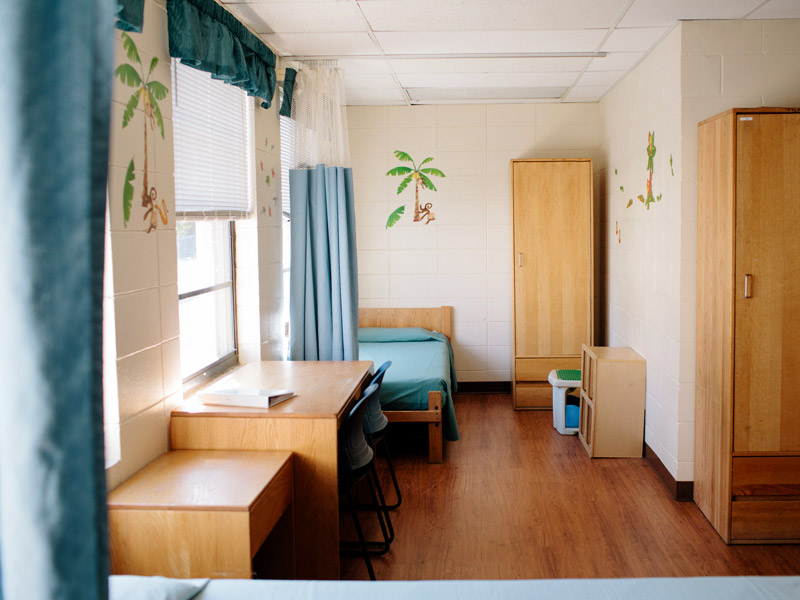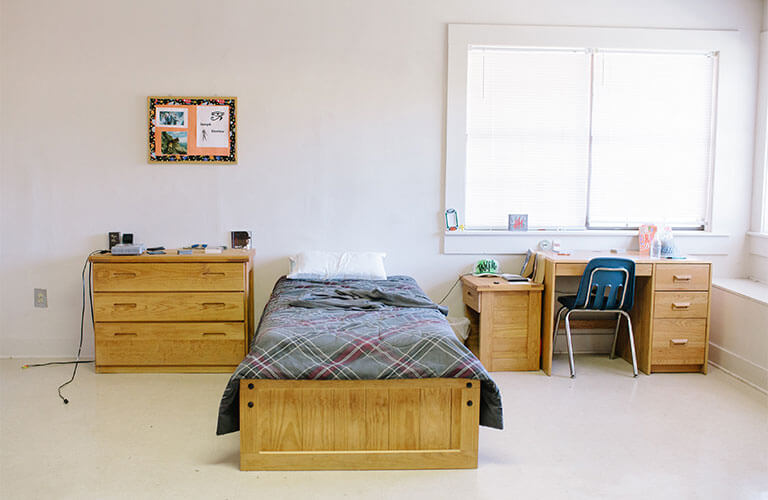Millcreek of Magee Treatment Center offers residential treatment and home-based programs for children & adolescents struggling with bipolar disorder and other psychiatric and behavioral disorders.
Learn About Bipolar Disorder Treatment
Learn more about bipolar disorder treatment at Millcreek of Magee Treatment Center in Mississippi
The methods for treatment utilized at Millcreek of Magee, a bipolar disorder treatment facility in Mississippi, effectively care for the unique needs of children and adolescents who come to us for treatment. With regards to treatment for psychiatric conditions that entail distressing symptoms, the compassionate staff at our bipolar disorder treatment center is trained to identify and alleviate symptoms of bipolar disorder. Characterized by episodes of mania and depression, bipolar disorder can cause a great deal of destruction in a sufferer’s life. Periods of mania, or extreme emotional highs, can bring about impulsive behaviors and make it difficult for an adolescent or teen to abstain from risky activities, such as promiscuity and engaging in criminal activity. Depressive episodes, or extreme emotional lows, can create a number of obstacles when it comes to completing even the most mundane of tasks. And while some young people will experience more episodes of mania than depression and vice versa, this debilitating mental health condition requires therapeutic intervention in order to prevent life-altering effects from occurring. Luckily, our bipolar disorder treatment facility in Mississippi can improve the lives of youth who battle symptoms of bipolar disorder.
Millcreek of Magee, a behavioral disorders treatment facility, has been a leading provider of behavioral healthcare and educational services to emotionally disturbed and developmentally delayed children and adolescents in the state of Mississippi for over 30 years. Maintaining our standing as the largest private provider of services to children and adolescents in the state, we strive to provide programming that emphasizes the individualization of treatment based on each child’s strengths. Our highly trained and qualified staff at our treatment centerworks towards increasing the self-esteem of all children and adolescents who are entrusted into our care in order to build their confidence and increase their ability to successfully navigate through treatment. When children and adolescents come to us struggling with bipolar disorder, we will do everything in our power to help them overcome their challenges while also teaching them the skills needed to embark on a bright and successful future.
How to Help a Loved One
Helping a loved one get treatment for bipolar disorder
The symptoms of bipolar disorder can be stressful for a sufferer of this condition and cause a great deal of worry and fear in those who care for the sufferer most. When n adolescent or teen is grappling with the symptoms of this condition, parents and caregivers may witness their child seemingly spin out of control as their child fluctuates between episodes of mania and depression. Rest assured, though, there are things that can be done to help a child or adolescent suffering from this serious mental health condition:
- Educate yourself about bipolar disorder
- After learning about bipolar disorder, its symptoms and effects, note any and all symptoms that you notice
- Consult with a mental health professional and consider an evaluation so that a definitive diagnosis can be determined
- Research treatment options that treat children and adolescents with bipolar disorder
- Reach out to the treatment center to discuss their programming and the different types of treatment that they offer
Once you have gathered this information it is important to do the following when discussing treatment with your child:
- Approach the discussion of treatment with an understanding that your child may be resistant
- Express your concerns in an empathetic manner, while being honest about your worries
- Be open to hearing how your child feels about engaging in treatment. With the knowledge you have gathered from researching treatment options, you may be able to dispel some of his or her worries and fears, if any
Lastly, it is important to be an ongoing source of support for your child and remain engaged in his or her therapeutic process. Offering unyielding support is one of the best things you can do for your child, especially since a strong network of support is a proven way to ensure successful treatment completion and maintenance of tools and skills learned in treatment.
Why Consider Treatment
Why consider treatment for bipolar disorderat Millcreek of Magee Treatment Center in Mississippi
Untreated bipolar disorder can lead to a number of devastating effects for a child or adolescent who suffers from symptoms synonymous with this mental health condition. There is an increased likelihood that a young person will develop an additional mental illness if bipolar symptoms are allowed to remain. Additionally, children and adolescents who suffer from bipolar disorder may eventually abuse substances as the drugs and/or alcohol can offer a false sense of relief from the symptoms of this disorder. Lastly, a young person’s ability to perform academically, interact socially, and demonstrate good decision-making could be compromised as bipolar disorder symptoms can create a number of obstacles in functioning. Treatment that is designed to treat bipolar disorder is available and can ultimately help children and adolescents with this condition go on to lead healthy and productive lives, free from the disruption of bipolar disorder.
Sometimes, more intensive treatment is required to alleviate the symptoms of bipolar disorder. Youth who struggle with this serious mental illness can greatly benefit from treatment set in psychiatric residential treatment centers. Within this type of care, young people and their families have access to trained and experienced mental health professionals and psychiatrists at a treatment facility who can identify, diagnose, and treat even the most severe symptoms of bipolar disorder. Young people who complete this treatment at a residential facility experience an increase in self-esteem and demonstrate effective methods for coping with the symptoms of bipolar disorder. Furthermore, children and adolescents who receive treatment for bipolar disorder in a residential treatment center have round-the-clock support from professionals, which is an advantage when it comes to learning new skills for coping and practicing them before returning home. Lastly, a psychiatric residential treatment facility is a great treatment option for youth who require ongoing encouragement and guidance as a life free from the destructive symptoms of bipolar disorder is realized.
Our Philosophy
Millcreek of Magee Treatment Center philosophy and treatment benefits
At Millcreek of Magee, a bipolar disorder treatment facility in Mississippi, we are dedicated to helping children lead healthier, more productive lives. By offering a residential treatment facility that places a strong emphasis on a child’s inherent strengths, our facility’s caring and compassionate staff tailors treatment plans to be individualized based on each child’s or adolescent’s unique set of needs, as well as on the skills they already have in place. Our bipolar disorder treatment center strives to consistently encourage the growth of children’s self-esteem and enhance their level of self-confidence and independence by developing activities that are based specifically on each patient’s strengths. Each child’s or adolescent’s bipolar disorder treatment process remains malleable as we incorporate changes based on needs or challenges as they arise. We also place a strong emphasis on the educational aspect of treatment, keeping in mind the crucial role that education plays in a child’s development and on his or her future. At our bipolar disorder treatment facility in Mississippi, we are devoted to consistently improving our programming by persistently addressing any requests, concerns, or issues that are brought forth in our patient surveys. Our patients are our top priority and we make it our sole mission to do all that we can to ensure their lasting success.
Types of Treatment
Types of bipolar disorder treatment offered at Millcreek of Magee Treatment Center in Mississippi
At Millcreek of Magee, a behavioral disorders treatment center in Mississippi, we strive to offer excellent customer service to everyone with whom we come in contact. We pride ourselves in our quick response to inquiries and referrals, and our treatment facility’s admissions staff works diligently to ensure that a smooth and timely transition into our care is offered for all potential patients. Once children and adolescents have been admitted into our psychiatric residential treatment center, they will partake in a number of therapeutic interventions that are tailored to meet each of their specific needs, while simultaneously enhancing and building upon the strengths they already possess. At our treatment facility, we use a cognitive behavioral approach to therapy in our programs here at Millcreek, which ensures that maladaptive thinking patterns are changed and positive behaviors are reinforced. Research-based journaling is utilized throughout individual and group therapies, which assists patients as they find success in their own treatment path.
The dedicated staff at our bipolar disorder treatment facility is proud to offer a positive-reinforcement based approach to care, guiding patients as they work through a Phase System throughout the course of treatment. This Phase System includes four distinct phases, Exploration, Knowledge, Motivation, and Achievement, and is accompanied by identified safety levels that reward children on their progress through bipolar disorder treatment. Such progress is acknowledged through each patient’s journaling and includes helping children and adolescents identify triggers that lead to their behaviors, as well as helping them come to understand the importance of accepting the consequences of their behaviors.
The following therapeutic interventions are incorporated into the overall, comprehensive care provided to patients in our psychiatric residential bipolar disorder treatment facility:
Medication management: Young people who are suffering from bipolar disorder often find relief from their symptoms through the implementation of certain psychotropic medications. Such needs will be determined on an individualized basis. We have board-certified child and adolescent psychiatrists on staff and on call 24/7 at our treatment center, as well as psychiatric nurse practitioners and family physicians who are available to meet any needs that our patients may have. Children and adolescents are seen at least once each week for medication management.
Individual therapy: Individual therapy sessions at our bipolar disorder treatment facility are designed to be a time for children to meet one-on-one with their therapists in order to track treatment progress, discuss any concerns or challenges they are facing, and to work on individual skill-building. These sessions occur at a minimum of once each week, but most patients benefit from additional sessions, as determined based on need or when requested.
Group therapy: Group therapy sessions at our treatment center occur at least three times a week, but are typically held more often. All group sessions are individualized based on the needs of the children present, but common topics of discussion include anger management, coping skills, relationships, independent living skills, trauma, and patient/student rights.
Family therapy: At Millcreek of Magee, a bipolar disorder treatment facility in Mississippi, we recognize how important family involvement is in a child’s or adolescent’s healing process and therefore hold family therapy sessions at a minimum of twice per month. We also allow children and adolescents the ability to make phone calls or visit with their family on a regular basis, ensuring that all family involvement is individualized in order to promote the most positive interaction possible for our patients and their families.
Education: All patients at our treatment center attend our onsite school Monday through Friday from 9am-3pm. All classes are led by Highly Qualified Licensed Teachers and classrooms have a student to teacher ratio of 10:1 maximum. There is at least one therapeutic aide present in all classrooms and one-to-one aides are provided for children when academically necessary.
Experiential therapies: In order to provide a fully holistic approach to treatment, our bipolar disorder treatment facility offers a number of additional therapeutic options on top of the traditional therapeutic methods. Such options include:
- Recreational therapy (held daily for all patients)
- Music therapy (including individual music and choir dance)
- Art projects
- Fitness club (intensive fitness programming is offered along with nutritional education)
- Walking club
- Book club
- Gym time (including activities such as flag football, volleyball, etc.)
Continuing Care
Continuing care and levels of treatment for bipolar disorder
At Millcreek of Magee, a behavioral disorder treatment facility in Mississippi, we understand how intimidating the end of treatment can be for many children and their families. For this reason, all discharge and aftercare planning begins at the time of admission. Appropriate discharge criteria is created for each patient depending upon their needs and bipolar disorder treatment goals. Once that criteria has been successfully met, the patient’s treatment team works with them as the next, most appropriate level of care is determined. Aftercare planning includes recommendations from the patient’s treatment team for medical, educational, and psychiatric services. Our staff will do everything in our power to ensure that the transition back into a less restrictive setting is a smooth and comfortable one for all parties involved, knowing that the most important thing is that your child or adolescent continues to be successful.



